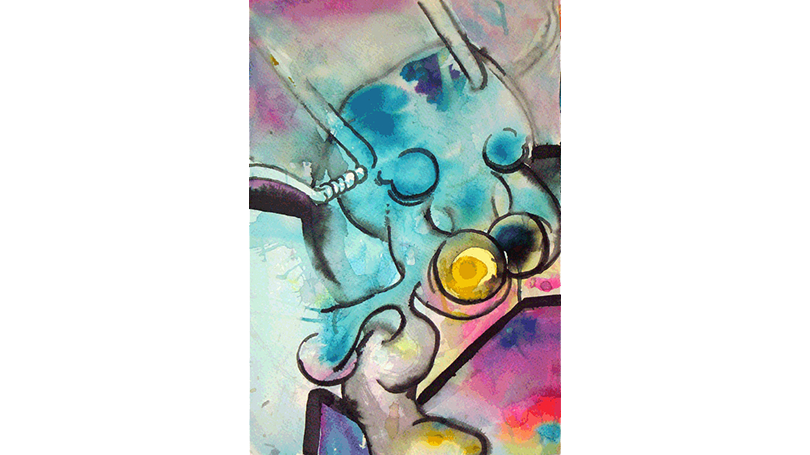
- About
- Education
- Research
- Engagement & Collaboration
- News & Events
Back to Top Nav
Back to Top Nav
Back to Top Nav
Back to Top Nav
The artist's May visit was part of the educational outreach for the Arthur L. Irving Institute for Energy and Society-funded project, "Energy and Indigenous Environmental Studies in the Americas," led by Dr. Laura Ogden. The project team includes Dartmouth professors Drs. Nick Reo and Christopher Sneddon and postdoctoral researcher Dr. Sarah Kelly.
In May 2019, the Mapuche-Wiliche artist Ragko (Julio Muñoz) visited the Dartmouth campus to talk about culture, art, water, and energy issues in Mapuche territory, located in southern Chile, with students and faculty.
Ragko talked about the importance of water for the physical and spiritual territory of Mapuche people, sharing his paintings of water and territory. Meeting with so many passionate students and faculty left Ragko inspired about his visit. He shared with students: "Before we talk about knowledge or energy, first we need to talk about different ways of seeing the world." With the participation of postdoctoral researcher Dr. Sarah Kelly, they discussed ongoing hydropower conflicts in southern Chile that involve indigenous rights claims of the Mapuche Pueblo.
A Need to Better Understand How the Transition to Renewable Energy Involves and Impacts Indigenous People
Ragko's visit is part of the educational outreach for the Arthur L. Irving Institute for Energy and Society-funded project, "Energy and Indigenous Environmental Studies in the Americas," led by Dr. Laura Ogden. The project team includes Dartmouth professors Drs. Nick Reo and Christopher Sneddon and postdoctoral researcher Dr. Sarah Kelly.
While the transition to renewable energy is a widely-accepted strategy to mitigate climate change, how this transition involves and affects indigenous peoples is not well understood. Indigenous people approach energy systems from different perspectives that reframe energy debates. Art, through visualization, encourages a more inclusive dialogue in knowledge exchange. Consequently, Ragko's visit formed part of a growing interest in energy and humanities at Dartmouth.
Artist Spoke to Two Undergraduate Classes
Ragko gave talks to two Dartmouth undergraduate classes with Sarah Kelly. The first talk was to an Introduction to Cultural Anthropology class (ANTH 3) where Ragko explained the cultural conflicts involved in the renewable energy transition in Chile, explaining how historical dispossession of the Mapuche Pueblo relates to current energy debates.Through his artwork, Ragko examines and explores Mapuche epistemology (way of knowing the world). His visual exploration relates to current energy conflicts in Chile, where different ways of knowing and being in territory are at stake.
Ragko also presented to visiting professor, Dr. Bernard Perley's Native American Studies class on visual art and Mapuche-Williche ancestral communities. Ragko shared his artistic work and discussed with students how art can be a tool to revitalize the presence of ancestral Mapuche culture and values. Discussing the trilogy of art, culture and science, Ragko and Dartmouth students identified common understanding to generate knowledge together.